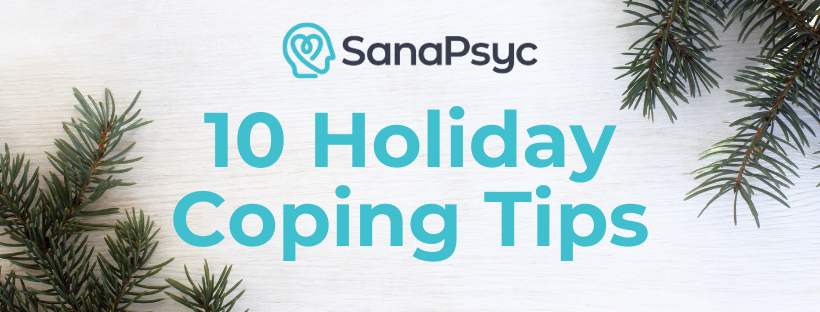Each year I find myself circling back around to writing about mental health over the holidays and how to navigate the season in the healthiest way possible. This is because each year is a cyclical repeat of certain patterns:
- Increased pressure (both internal and external)
- Increased resentment
- Increased stress and overwhelm
- Financial demands that can become unmanageable
Guess what? High stress + more intense feelings + less resources (energy, money, and time) to deal with them are not a good combination for mental health. These factors exacerbate existing mental health vulnerabilities with anxiety, mood/depressive issues, trauma, addiction, and more. They can also manifest mental health symptoms that people may not normally struggle with, like low motivation, higher worry, control, perfectionism, and/or a desire for avoidance and escape.

Where Does the Stress Come From?
I hate to blame big ol’ society but, unfortunately, the way our society has moulded its expectations for the holiday season is a huge contributor to poor mental health outcomes and the high stress the season brings. We are inundated with images, commercials, and messaging at so many levels about what the holidays are supposed to mean and look like and much of that revolves around socializing, food, alcohol, and tangible gifts. This leaves people feeling that if they want to enjoy a quieter and/or simpler holiday season that they are somehow doing it ‘wrong’ or ‘bad’ and are inadequate, which also leads to poorer mental health outcomes. Who wants to feel inadequate?
In addition to societal stress, individuals internalize these messages in their own ways which impacts mental health. Each family have their own traditions and values and these are passed on and morph from generation to generation. We now see a lot of younger parents trying to do it all and fit in work, active parenting with lots of activities for their children, along with the added demands of the holidays- it’s amazing how much time can be spent organizing an Elf-On-the-Shelf or a homemade advent calendar. The long and the short of it is, even if you enjoy the holiday mayhem, it is still an added demand on already full plates.
Poor Boundaries.
Who out there feels like they have good boundaries when it comes to saying no to internal, external, and societal pressures? If you said yes, good for you! If you are saying maybe, sometimes, or not really, you are definitely not alone. It is difficult to say no to your best friend when they invite you to a holiday gathering (or two or three), to a family member who invites you to go look at Christmas lights, to your work Christmas party, and to the running litany of ‘to-do’s’ in your mind from food to work to gifts to activities. All of these situations have an impact on our mental health.
Boundaries are not just about saying ‘no’ to things (although they can be), it is also about being aware of what you are and are not capable and comfortable of taking on in order to preserve and protect your mental health. For example, with a holiday party invitation you may feel like you could say YES to:
- Going for a few hours
- Bringing a pre-made dish from the grocery store
- Wearing last year’s holiday sweater
You may feel like you would say NO to:
- Staying for 5 hours
- Drinking alcohol
- Bringing homemade food
- Bringing gifts
- Buying a new outfit
There are generally subtle nuances within situations that can inform boundaries-what we say yes to and what we say no to. To learn more about boundaries and how they impact mental health, I encourage you to read one of our past blog posts on ‘Boundaries: An Inside Job.’ I also encourage you to take a situation and ask yourself:
What parts of this am I comfortable with?
What parts of this am I not comfortable with?
Now you have your boundary holiday plan! This allows you to participate in life and events without feeling drained and resentful. It can also support your ongoing mental health and addiction recovery journey because you are not sacrificing your healthy action steps to please others.
Speaking of pleasing others, stay tuned for our next blog post which is all about people pleasing and contains a self-assessment quiz to determine where you are at! How exciting.
Back to some tips for helping you navigate the holidays in a healthy and grounded way.

10 Holiday Coping Tips:
- Look for shortcuts to keep it simple. If you normally drive yourself wild trying to get the perfect gift or make the perfect dish, simplify. Make a card with a meaningful message, buy something frozen or pre-made. People care about you, not the thing in your hand that you are giving to them.
- Show up authentically. Be yourself. Skip the make-up and fancy outfit if that’s not your style, bring gifts (or don’t) depending on your values, and don’t feel you have to have alcohol just to “fit in” or be likeable- you’re amazing just the way you are! Authenticity is one of the best things to keep our mental health in a good, strong state.
- Establish expectations ahead of time. Clarify with family if there is going to be gift exchange, or maybe draw names to buy for one person rather than everyone, or maybe decide to have a new holiday tradition focused on games or jokes rather than presents. Clarifying what everyone’s part is in holiday gatherings and what will be possible can alleviate a lot of internal pressure.
- Spend more time doing the things that replenish you. When we get stressed, our first instinct is to treat our own self-care as optional. This becomes obvious when people come in seeking depression counselling or anxiety counselling and have departed from their normal healthy habits at the expense of their wellbeing. Don’t feel you can spare more time? At least try and maintain your regular recovery routines as this is the equivalent of plugging in your phone to keep the battery charged when you’re using it more. Your mental health will thank you!
- Consider your values. It’s easy to get caught up in other people’s expectations and values and forget about our own. Maybe you’ve been living “as if” these things matter to you when they really don’t. Perhaps you prefer to focus on small gatherings that prioritize yummy food, or perhaps you value getting out in nature and disconnecting while you have the time. Living in alignment with your values may change your actions and holiday plans, but will leave you feeling that you enjoyed the time and were able to spend it with like-minded connections rather than trying to fit in where you don’t want to belong.
- Have fun. Consider the things that you enjoy. Games, music, dancing, gift wrapping, baking, volunteering, church, Secret Santa, and the list goes on. Whatever floats your boat, lean into it! Do things that are fun and set them up as fun rather than a chore or a have-to. Here is an article about how to have fun with yourself and others.
- Remember: This is all voluntary. Whether you believe it or not, everything you are doing during the holiday season is chosen, not mandatory. If you are not happy with feeling forced to do things, remind yourself that it is a choice. People do better when we feel autonomy and free will rather than locked in to things.
- Pause. Breathe. Exhale. Did you know that when we are stressed we actually breathe differently? (Click here to learn more about how) We tend to do more shallow chest breathing as though we are panting rather than long, slow inhales and exhales. By focusing on mindful, paced breathing in and conscious, long exhales, we are giving our body the signal that we are safe, relaxed, and everything is okay. This tells our mind that we can relax and then we do! Our breath is an amazing tool for health, relaxation, and mental health. Looking for other quick relaxation tools? Visit our last blog post for 20 practical relaxation strategies that can easily be done anywhere, anytime!
- Minimize exposure to malls and media. Going out to a mall in December can flood us with stimulation and reminders of the expectations of the holiday. Same thing with following certain accounts and influencers. It’s okay to take a break from these things, whether permanent or temporary, to provide balance and stability. Focus on the priorities that matter most to you and perhaps you will get more satisfaction from going for a walk rather than racing around town trying to find that perfect gift.
- Go inwards. We often feel the most lost when our internal compass is not aligned. We may be chasing what we think we should be chasing, or what others are encouraging us to prioritize, rather than what actually matters to us. Taking time to slow down, be quiet and still (even for just a minute or two) can help our intuition come online and start to guide us in the right direction for us.
It is more than possible to navigate the holiday season with tranquility, peace, and sanity. These tips, combined with your other self-care and recovery strategies, can give you the resources to move through the season relatively unscathed and, perhaps, even enjoy it!
Paige Abbott is a Registered Psychologist and Founder of Sana Psychological in Calgary and Airdrie, Alberta. The clinicians at Sana Psychological offer some of the best psychological services as they are evidence-based, trauma-informed, and can support you and your family with most of your mental health and addiction needs, including depression counselling, anxiety counselling, trauma counselling, couple’s counselling, grief therapy, addiction counselling services, codependency counselling, and more.
We are happy to support you wherever you are at in your mental health journey and appreciate you spending time with us on our blog. Check out our other free resources on our Resources Page and read other Blog posts Here.


